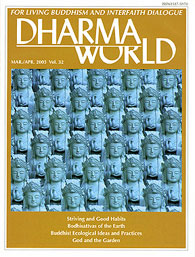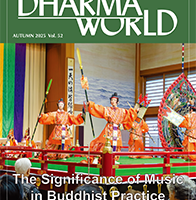March-April 2005, Volume 32(PDF)
“Thousand Buddhas,” Sanbanggulsa Temple, South Korea
From the Advisor’s Desk
Heeding the Voices in Our Hearts by Kinzo Takemura
Reflections
Striving and Good Habits by Nichiko Niwano
“All phenomena are constantly changing. Strive to practice my teachings diligently.” These are said to have been Shakyamuni Buddha’s last words. They indicate that recognizing impermanence and striving to advance spiritually are the keys to the practice of Buddhism. The following is a translation of a recent interview with Rev. Nichiko Niwano that originally appeared in Rissho Kosei-kai’s Japanese periodical Yakushin.
Nichiko Niwano is president of Rissho Kosei-kai and the Niwano Peace Foundation, a president of the World Conference of Religions for Peace (WCRP), and chairman of the Japanese Association of Religious Organizations.
The Role of Faith in a Moral Life by Nikkyo Niwano
This essay is part of a continuing series of translations from a volume of inspirational writings by the late founder of Rissho Kosei-kai. DHARMA WORLD will continue to publish these essays because of their lasting value as guidance for the practice of one’s daily faith.
Nikkyo Niwano, the late founder of Rissho Kosei-kai, was an honorary president of the World Conference of Religions for Peace (WCRP) and was honorary chairman of Shinshuren (Federation of New Religious Organizations of Japan) at the time of his death in October 1999.
The Stories of the Lotus Sutra
Bodhisattvas of the Earth by Gene Reeves
Chapter 15 tells of the enormous number of bodhisattvas who sprang up out of the earth, whom the Buddha explains he himself has been teaching and leading from the most remote past.
Gene Reeves is currently studying, teaching, and writing on Buddhism in Tokyo. A consultant and teacher at Rissho Kosei-kai, he was recently a research fellow at Rikkyo University. Before coming to Japan in 1989, Dr. Reeves was the dean of Meadville/Lombard Theological School and professorial lecturer in the Divinity School of the University of Chicago.
Essays
Buddhist Ecological Ideas and Practices by Wei Dedong
Buddhism itself is not ecology, but it contains extremely profound ecological ideas and practices. Their philosophical basis can be found in the teaching of “dependent origination.”
Wei Dedong is an associate professor at the Renmin University of China in Beijing, specializing in Buddhist philosophy and the sociology of religion. His major works include Fojiao Weishi Zhexue Yaoyi (The Essence of Yogacara Philosophy) and Fojiao De Shengtai Guan (The Ecological View of Buddhism).
God and the Garden by Kenneth J. Dale
In this essay, the author shares some of his musings and discoveries regarding the questions: Who is God? What is God? Where is God? How do we talk about God?
Kenneth J. Dale retired in Claremont, California in 1996, after spending forty-five years as a missionary and professor at the Japan Lutheran College and Seminary in Mitaka, Tokyo. He founded and directed the Personal Growth and Counseling Center of that college. He is the author of Circle of Harmony and A Seeker’s Journal: Questioning Tradition–Strengthening Faith.
Meditation and Compassion in Action by Bhikkhu Sanghasena
We must make meditation and compassion part of our daily lives, like our breathing. True compassion, true love is to serve others, to share all good things with others, to share the pain and sufferings of all fellow beings.
Bhikkhu Sanghasena, born in Ladakh, India, received full ordination under Ven. Acharya Buddharakhita Maha Thera, founder-president of the Mahabodhi Society Bangalore. He founded the Mahabodhi International Meditation Centre at Leh, Ladakh, to promote meditation and compassion.
Gotama Buddha (71)
The Historicity of Gotama Buddha by Hajime Nakamura
Buddhists in southern Asia and those in northern Asia disagree on the most likely dates for the Buddha’s birth and death. Scholars around the world still debate the issue, but seem agreed that he usually displayed warm affection for his followers.
The late Dr. Hajime Nakamura, an authority on Indian philosophy, was president of the Eastern Institute in Tokyo and a professor emeritus of the University of Tokyo at the time of his death in October 1999. This ongoing series is a translation of Gotama Buddha, vol. 2 (Tokyo: Shunjusha, 1992).
Buddhist Living
Coming Home by Carol J. Ewer
An American member of Rissho Kosei-kai describes how her introduction to Buddhist teachings and experience in hoza counseling sessions allowed her to confront the truth about her life.
Carol J. Ewer is a member of Rissho Kosei-kai of Oklahoma.
Small Trips of Self-Discovery by by Etsu Sakamoto, Hiroe Terauchi, and Satoe Takahashi
Three members of Rissho Kosei-kai relate how their lives have changed through their participation in training sessions at the seminar house in Ome, a western suburb of Tokyo. Within the beauty of nature, various programs–sutra chanting, hoza, lectures on the Lotus Sutra, as well as forest conservation work–were conducted during the two- or three-day sessions. Since the Ome Seminar House was established in 1966, a large number of members, including many youths, have visited it, making friends with fellow participants, discovering their inner selves, and confirming the joy of having faith.
The Threefold Lotus Sutra: A Modern Commentary (81)
The Sutra of the Lotus Flower of the Wonderful Law
Chapter 9: Prediction of the Destiny of Arhats, Training and Trained by Nikkyo Niwano
This is the eighty-first installment of a detailed commentary on the Threefold Lotus Sutra by the late founder of Rissho Kosei-kai, Rev. Nikkyo Niwano.























































































